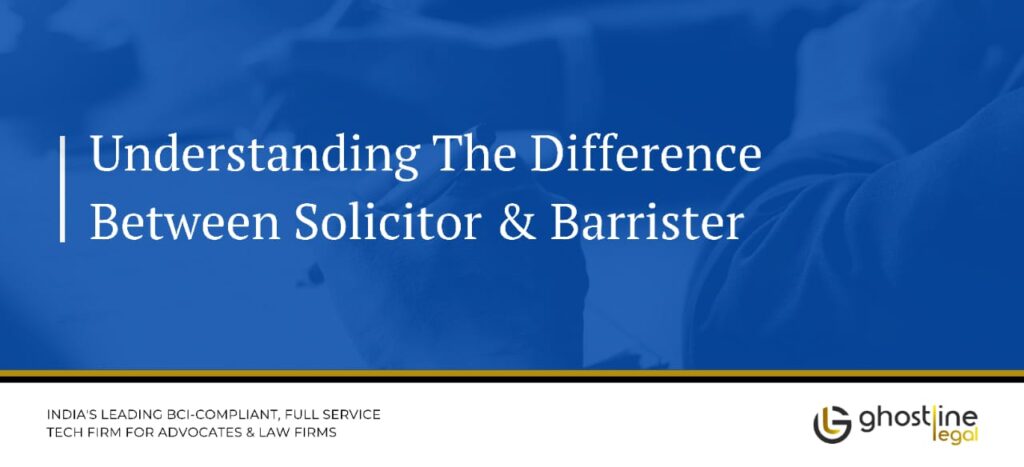Solicitors and barristers are two types of legal practitioners with different roles and responsibilities in the legal system.
The major distinction is that a barrister represents clients in court through great public speaking and advocacy, whereas a solicitor undertakes legal work outside of court. This distinction, however, does not apply to all situations. Let’s delve deeper into the subject –
Who is a Solicitor?
A solicitor is a qualified legal practitioner who can take client’s instructions and advice on appropriate legal action. Solicitors may be in charge of providing legal advice, creating contracts, and negotiating settlements.
In the event of a court case, a solicitor will prepare legal paperwork. Solicitors provide expert legal advice to clients on a wide range of legal issues, which are classified as contentious or non-contentious.
Solicitors typically work in law firms or in-house legal departments and frequently interact directly with clients. Clients can include individuals and groups, as well as governmental and private sector organizations.
Who is a Barrister?
Barristers typically specialize in courtroom argument and litigation, drafting legal briefs, providing professional legal opinions, and researching legal theory and history. They are in charge of presenting cases in court, discussing legal issues, and cross-examining witnesses. A barrister appears in court wearing a wig and gown.
Barristers must observe specific rules and regulations when practicing, as specified in the Bar Standards Board (BSB) Handbook. The guidelines outline what is expected of barristers, including their primary responsibilities, and include a list of the most significant things a barrister should and should not do.
Similarly, the regulations address how barristers should conduct themselves, what they can do while doing their duties, and how they would be punished if they violate code of conduct norms.
What Does a Solicitor Do?
Solicitors represent and defend their client’s legal interests, providing counsel in a variety of situations such as –
-
- Protecting individual rights against public or private bodies.
- Assisting businesses with personal interactions.
- Assisting civil litigation matters.
- Giving advice on divorce proceedings.
- Managing immigration and asylum cases.
A solicitor’s work includes two major areas –
- Contentious Legal Work – Resolving conflicts between parties, typically in court or tribunals.
- Non-contentious Legal Work – Handling legal aspects of clients’ company or personal problems, such as merger management or will drafting.
Their duties include –
-
- Communicating with clients and legal professionals.
- Research cases and legislation.
- Drafting legal documents.
- Representing clients in court or before tribunals.
What Does a Barrister Do?
A barrister has a separate role, and solicitors frequently hire them for courtroom representation when necessary. They specialize in court advocacy and provide independent legal counsel to clients. The majority of barristers work for themselves, from their chambers, however they may also work for the government or the private sector.
Their responsibilities include –
-
- Interpreting the law and offering legal opinions.
- Accepting directions from clients and solicitors.
- Conducting legal research and preparing legal arguments.
- Giving legal advice and assessing case strength.
- Representing clients in court, making arguments, and questioning witnesses.
- Negotiating settlements and representing client’s interests.
- Barristers specialize in specific areas of practice, such as criminal advocacy in court.
- Family barristers conduct divorce proceedings in court.
- Commercial barristers prefer drafting and consulting work over court appearances.
Differences Between Solicitor and Barrister Training
To become a solicitor, one can take the Solicitors Qualifying Exam (SQE) after getting a legal degree or completing an apprenticeship. The SQE consists of two phases, followed by two years of Qualifying Work Experience (QWE). Aspiring solicitors frequently seek training contracts to gain practical experience, and preparation courses such as those offered by The University of Law help them prepare for exams.
To become a barrister, one must first get a qualifying law degree and then do the Bar Professional Training Course (BPTC). Unlike solicitors, there are no apprenticeships for barristers. Law schools or Inns of Court frequently provide scholarships to barristers for their training.
Solicitors and barristers have distinct roles in the legal system, with each having their own set of obligations and work routines. Solicitors, being the primary point of contact for clients, perform a wide range of activities, from legal research to client communication, and frequently specialize in either contentious or non-contentious matters. They are often employed by legal firms or business entities, where they have a stable income and perks. Barristers, or specialized advocates, are called upon by solicitors for complex issues that require courtroom representation and experience in certain legal subjects such as criminal or public law.
Barristers operate as self-employed entities linked with chambers, navigating income uncertainty, flexible work hours, and workload changes. While solicitors focus on direct client connections and continuous advising duties, barristers excel at courtroom advocacy and case-specific tasks. Additionally, aspiring legal professionals have access to a variety of work experience possibilities, ranging from vacation packages for lawyers to shadowing barristers, setting avenues for lucrative career pathways with diverse pay scales.
Fee Structures
Solicitors
solicitors often bill using the “billable hour” model, with extra choices such as no-win fee reductions or fee caps, which are often determined by senior solicitors such as partners. Billing rates vary depending on the client and nature of the work being performed.
Barrister
Barristers frequently bill on a daily basis rather than by the hour. They may want an upfront fee before beginning work, with further payments paid on a daily basis.
In summary, while barristers and solicitors share the distinction of being highly qualified legal specialists, their career paths differ significantly. Assessing aspects such as work-life balance and wages requires personal judgements that reflect an individual’s personality and aptitude. Finally, choosing between these options necessitates careful consideration. However, both avenues promise substantial fulfillment for aspiring legal professionals when navigated with insight and acumen.
Ghostline Legal is India’s leading, BCI-compliant, full-service tech and content firm catering exclusively to advocates and litigation chambers.










